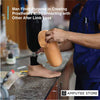Identify the Common Limiting Beliefs That Hamper Your Growth
You probably have at least one limiting belief. "I can't use my prosthetic limb properly." "I'm not the type who works out. I'm not fit." Whatever your limiting beliefs are, most of these are developed in childhood before you had the self-awareness to understand your thoughts.

Limiting beliefs often form your personal beliefs, which are your ideas that certain things are real. These are usually backed by an emotional, moral, or spiritual certainty. While some views are ingrained, others are up for exploration or discussion.
What are limiting beliefs?
Limiting beliefs restrict you in some way—and they're often based on fear or self-doubt. You also inherit many limiting beliefs during childhood. Maybe your swim coach told you that you weren't athletic. Perhaps you didn't get the part you wanted in the school play. Whatever it was, you held these moments close enough that they became a part of your limiting beliefs. And these moments were often laced with embarrassment, fear, or shame.
Think of this faulty thinking as manifestation gone wrong. Instead of visualizing and manifesting the good, you held on to your self-limiting beliefs.
Examples of limiting beliefs
Often, your limiting beliefs will be preceded by the following:
"I can't," "I don't," "I shouldn't," "I'm not," "I've tried, and…," "It's too late," "They're better," "I don't deserve," "I'm not worthy," "There's someone better," and "I've been told."
These may come into play when you're on your fifth amputee training session and feel frustrated that you can't seem to get things right. You may tell yourself, "I can't do this." Perhaps your physical therapist advised you to add regular exercise to your routine. You may say, "Oh, I'm not the exercising type." Or maybe there's a new diet your doctor prescribed you, and you immediately think, "But I don't like vegetables."
By immediately thinking about these thoughts, you are already limiting yourself when a few more training sessions would have shown you progress or starting an exercise regimen will surely but slowly build your endurance and strength. And even though you may not like vegetables now, a few well-made vegetable dishes would have convinced you otherwise.
How to overcome these limiting beliefs
All the limiting phrases and sentences above come from a fixed mindset. But the antidote to these beliefs is to try and try again.
Limiting beliefs don't do anything for your self-confidence. It doesn't serve you in the long run, so you must reframe some of your negative thoughts.
Identify the belief
As with any other problem, the first step to overcoming limiting beliefs is identifying them. You may want to write this down so you can come face to face with your limiting beliefs.
Identify the lie
All limiting beliefs contain a lie. This is how it gains power over you. For example, your limiting belief is you can't use your prosthetic limb. It seems that no matter what you do, you can't operate it properly. However, all it takes is more time and energy to learn how to use it.
The lie: I can't use my prosthetic limb.
The solution: Dedicate more time each day to training and using your prosthetic limb. After a few weeks or months, you'll see that you can operate your prosthesis as efficiently as possible.
Get professional help
Some of your limiting beliefs may not be easy to shake off. These negative thoughts may be so deeply ingrained that they feel impossible to overcome. In these instances, it's best to seek professional help. A therapist can help clear up your assumptions and perceptions about yourself.
Just do it
If something seems doable, do it, despite the fear you may feel. Do your best to reframe your limiting beliefs and see what happens. If you test the boundaries of your capabilities, you can come closer to your full potential.
Remember, by enacting a growth mindset and breaking old habits, you can gain a better understanding of who you are and what you're truly capable of.










































































